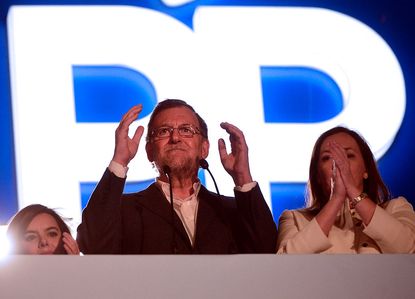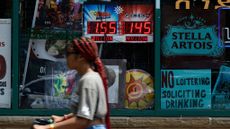Spain's ruling conservatives win plurality in national vote, but may lose power


Spain voted in national elections on Sunday, and the result is expected to be weeks or even months of political uncertainty. The governing conservative Popular Party of Prime Minister Mariano Rajoy won the most votes, getting 123 seats in Spain's 350-seat parliament, but that's a sharp drop from the 186 seats it won four years ago and 53 seats shy of the 176 it needed for a ruling majority. The opposition Socialist party came in second, with 90 votes, while two new parties — the leftist, anti-austerity Podemos party and the centrist, business-oriented Ciudadanos party — came in third and fourth place, with 69 and 40 seats, respectively.
Neither of the natural coalitions — PP-Ciudadanos or Socialist-Podemos — would have enough seats to form a governing coalition, and it's unlikely Rajoy will pick up the support of the regional parties that make up the bulk of the remaining 28 seats. Spain has never had a "grand coalition" government where the two main established parties join together, and based on campaign rhetoric, the PP and Socialists aren't expected to form the first one. Ciudadanos has said it won't join with the PP as long as Rajoy is prime minister, given the corruption in his government, but it could abstain from voting in parliament, allowing Rajoy to form a minority government.
After the results were announced, Rajoy said he will "try to form a stable government," without specifying how. Socialist leader Pedro Sanchez said that Rajoy has first crack at forming a government, but that whatever happens, Spain is "entering a new political phase." Podemos leader Pablo Iglesias has a similar message, but one he delivered with evident glee: "Spain is not going to be the same anymore." Investors reacted negatively to the election results early Monday. For more, you can watch The Wall Street Journal's Mark Kelly report below. Peter Weber
Subscribe to The Week
Escape your echo chamber. Get the facts behind the news, plus analysis from multiple perspectives.

Sign up for The Week's Free Newsletters
From our morning news briefing to a weekly Good News Newsletter, get the best of The Week delivered directly to your inbox.
From our morning news briefing to a weekly Good News Newsletter, get the best of The Week delivered directly to your inbox.
Sign up for Today's Best Articles in your inbox
A free daily email with the biggest news stories of the day – and the best features from TheWeek.com
Peter has worked as a news and culture writer and editor at The Week since the site's launch in 2008. He covers politics, world affairs, religion and cultural currents. His journalism career began as a copy editor at a financial newswire and has included editorial positions at The New York Times Magazine, Facts on File, and Oregon State University.
-
 Why Bhutan hopes tourists will put a smile back on its face
Why Bhutan hopes tourists will put a smile back on its faceUnder The Radar The 'kingdom of happiness' is facing economic problems and unprecedented emigration
By Chas Newkey-Burden, The Week UK Published
-
 7 beautiful towns to visit in Switzerland during the holidays
7 beautiful towns to visit in Switzerland during the holidaysThe Week Recommends Find bliss in these charming Swiss locales that blend the traditional with the modern
By Catherine Garcia, The Week US Published
-
 The Week contest: Werewolf bill
The Week contest: Werewolf billPuzzles and Quizzes
By The Week US Published
-
 Nobody seems surprised Wagner's Prigozhin died under suspicious circumstances
Nobody seems surprised Wagner's Prigozhin died under suspicious circumstancesSpeed Read
By Peter Weber Published
-
 Western mountain climbers allegedly left Pakistani porter to die on K2
Western mountain climbers allegedly left Pakistani porter to die on K2Speed Read
By Justin Klawans Published
-
 'Circular saw blades' divide controversial Rio Grande buoys installed by Texas governor
'Circular saw blades' divide controversial Rio Grande buoys installed by Texas governorSpeed Read
By Peter Weber Published
-
 Los Angeles city workers stage 1-day walkout over labor conditions
Los Angeles city workers stage 1-day walkout over labor conditionsSpeed Read
By Justin Klawans Published
-
 Mega Millions jackpot climbs to an estimated $1.55 billion
Mega Millions jackpot climbs to an estimated $1.55 billionSpeed Read
By Catherine Garcia Published
-
 Bangladesh dealing with worst dengue fever outbreak on record
Bangladesh dealing with worst dengue fever outbreak on recordSpeed Read
By Catherine Garcia Published
-
 Glacial outburst flooding in Juneau destroys homes
Glacial outburst flooding in Juneau destroys homesSpeed Read
By Catherine Garcia Published
-
 Scotland seeking 'monster hunters' to search for fabled Loch Ness creature
Scotland seeking 'monster hunters' to search for fabled Loch Ness creatureSpeed Read
By Justin Klawans Published